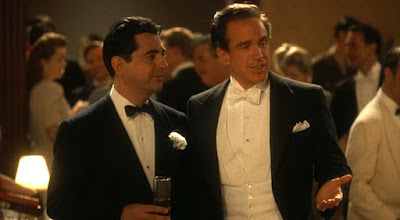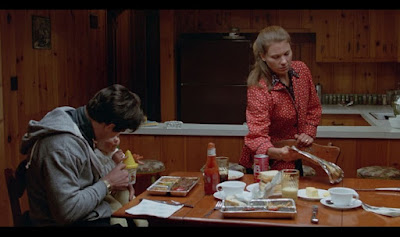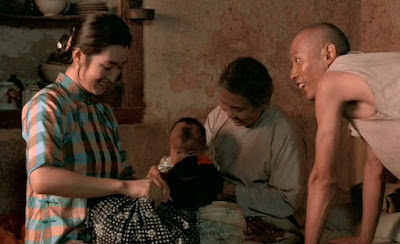"
The Ice Storm"
*** (out of ****)
"On the verge of saying something" speaks one of the characters in Ang Lee's "chilly" tale about emotional thawing and suburban middle class morality, "The Ice Storm" (1997).
Regret is too weak a word for what I am feeling this year on the blog, thanks to my year long theme of re-examining films previously placed on my various annual "top ten" lists that I have dubbed Was I Right?
When I first saw "The Ice Storm" in 1997 it was a revelation for me. I honestly can't explain why but the film had a profound affect on me. I perceived it as not only the very best film of 1997 but also one of the best films of the 1990s. I believed the film was deeper and richer than "American Beauty" (1999), another film about suburban life, which garnered much more acclaim a couple of years later. Going as far as to win the Academy Award for best picture.
I looked forward to revisiting this film in the hopes it would transport me back in time to when I first saw it. Being much older perhaps now I would be able to articulate what was so powerful about the film. But I can't. I wasn't emotionally moved by the film. Intellectually I understand what Ang Lee is showing us here but for the overwhelming majority of the film, my sympathies were never aligned with any of the characters.
Being on the verge of saying something is a key observation in Lee's film comprised of Connecticut suburbanites unable to express themselves emotionally or verbally. Set in the early 1970s, Thanksgiving 1973 to be exact, change is in the air. President Richard Nixon is less than a year away from resigning due to Watergate. There is a shift in sexual morals . Husbands take their wives to see pornographic films like "Deep Throat" (1972) and white middle-class couples think they are being hip by throwing swinger parties. What is the world coming to? The answer to that question isn't one that fills these people with excitement. They are numbed by gloom and despair instead. Every character is desperate to suppress their feelings with alcohol or marijuana.
While on an individual level these characters flounder, another point director Lee is making is about the functionality and the strength of the family unit. Drawing comparisons, to of all things, the Fantastic Four comic books, "The Ice Storm" seems to suggest our survival and downfall all depends on our relationship with our family. Or as one character explains it in the movie, "the deeper you are drawn in, the more into the void you go."
Kevin Kline stars as Ben Hood, husband to Elena (Joan Allen). They are having unexplained marital problems, which we can see is having a strain on their intimacy. Together they have two children, son Paul (Tobey Maguire) and daughter Wendy (Christina Ricci). Paul is attending an out-of-state college and will return home for Thanksgiving break. In college Paul is something of a pot-head with roommate Francis (David Krumholtz). He claims to be in love with Libbets (Katie Holmes), who he tries to impress with a knowledge of Dostoevsky. While Wendy is in her teenage angst phase, leading her to smoke cigarettes and kind of, sort of date one of her neighbors' sons, Mikey (Elijah Wood). In ever scene Mickey is in, he has a trance like look on his face and whenever asked a question by an adult his response is "I don't know." It's as if the world keeps catching him off guard.

The film splits its focus between the adults not being able to express themselves with each other and not being able to interact with their children. Sometimes even switching the dynamics as when Wendy asks her mother if
she is okay. In one awkward scene Ben, after greeting Paul at the train station, explains on the drive home, why it isn't a good idea to masturbate while taking a shower. This is Ben's attempt at bonding with his son. While Mikey didn't even realize his own father, Jim (Jamey Sheridan) was out of town on a business trip. Than again, Jim doesn't realize his wife, Janey (Sigourney Weaver) is having an affair with Ben.
With Ben seemingly in a loveless marriage one could assume an affair with Janey would be filled with passion and lust. You'd be wrong. There is no joy when they are together either. After having sex Ben starts to complain about a co-worker, to which Janey states, "you're boring me." We also never come to find out what is wrong with Janey and Jim's marriage. It is as if these characters are simply on an endless search looking for kicks. There is no deep motivation for what they do.
And Janey has her hands full with her two sons. The youngest, Sandy (Adam Hann-Byrd) has a deeply troubling preoccupation with death and destruction. Sandy likes to occupy his time by taping explosives to his toys and watch them blow up. Even the kid's G.I. Joe pull string figure knows something is up. It has malfunctioned and repeats the same line, a call for help, "May day! May day!"
For some readers this may sound like a bit too much. Who wants to watch a movie about so much pain. No wonder I didn't like it. However that isn't exactly what is wrong with "The Ice Storm". Great art inspires me even if its content is sad. It can still give me a high that can last for days. Just the sheer thrill of experiencing something that stirred my emotions. For a example, a movie that is about a lot more pain than what we see here is Ingmar Bergman's "Cries & Whispers" (1973). That film is a masterpiece because of the way it draws us into the character's lives. "The Ice Storm" can't transpose that pain from the screen and into our hearts. In Janet Maslin's New York Times review of the film she writes, "The Ice Storm" still elects to keep its characters and their emotions at a distance. They remain as hidden from the viewer as they are from one another, which is an essential part of the film's disturbing power." I must disagree, even though I normally thoroughly enjoy Maslin's insights. She is suggesting the withdrawn nature of the characters actually pulls us in. Their distance becomes compelling. It is a fundamental difference in viewing this material. For me their distance kept me at a distance.
Perhaps the problem lies within screenwriter James Schamus adaption of Rick Moody's novel, which did win an award at the Cannes Film Festival, where the film was also nominated for the Palm d'Or. Having never read Moody's work, maybe the script is too literal of an adaption. It seems much of this material is internal, centering on inner feelings of the characters. This can often be difficult for filmmakers to express visually.
For me the film's greatest strength lies in its ability to capture a feeling for the time period and the mood it creates. The music by Mychael Danna helps to capture the despair floating the air, with the sweet sounds of the flute. I also liked the sound design and the light touch of the crackling sounds of ice being heard.
Earlier this year I took another look at the movie
"The Contender" (2000), which also proved to be somewhat disappointing upon a second look. In that review I complained about Joan Allen's performance. It didn't feel like a real character with emotions. In "The Ice Storm" however I believe she gives the film's best performance. From the entire talented cast she is best at expressing the level of repression building in everyone. Some viewers might criticize performances like this as not
doing anything. Somewhere along the way the public has convinced themselves acting has to be splashy. But watching Allen's performance I did want to know more about this character. It speaks to Maslin's observation about the withdrawn pulling us in. In Allen's case her facial expressions and body movements did accomplish that. It is interesting to note the following year Allen would continue to play a repressed character in the satirical "Pleasantville" (1998). Perhaps these characters are what drew her to the role in "The Contender" where her character would be viewed much more as a sexual creature. Tellingly of these three performances it was for "The Contender" she received an Oscar nomination, her last one to date.
The performances I felt were the weakest, were the children, with the exception of Christina Ricci's Wendy. The only character of all the children that really felt developed. Elijah Wood's Mikey is almost a throw-a-way character with brother Sandy having a bit more substance. Adam Hann-Byrd is able to better express a fear of the unknown that comes along with growing up. Maguire starts off strong but unfortunately gets lost in the background, basically having his character serve as book ends to the story.
Janet Maslin brought up a good point in her review, that is echoed in my choices for the most effective performances in the film. The strongest characters are the female ones. As a critique of the 1970s it is observing the period through the eyes of women that the film can make its most compelling arguments regarding the shifting times. That is also to be found in "Pleasantville". The change in the social winds affect those that have the most to gain. Historically that would be minorities, in "The Ice Storm" it is suburban white women.

The aforementioned ice storm, at the end of movie, should pack more of an emotional wallop. As a metaphor for the emotional state of the characters, the eventual thawing of the ice and feelings, should have earned our tears and carry a great emotional heft with it. Unfortunately, all I was able to do was watch their pain, understand their pain, but never sympathize with their pain. Leading me to ultimately determine I wasn't right. "The Ice Storm" wasn't the best film of 1997 nor should it have been on my list of the
top ten films of the year. That list will need to be updated.
"The Ice Storm" was Ang Lee's fifth feature-length film as a director, coming off two back-to-back critically acclaimed films, "Eat Drink Man Woman" (1994) and "Sense and Sensibility" (1995). "Sensibility" alone was nominated for seven Oscars, including best picture. Looking at those films and what Lee would go on to direct -
"Crouching Tiger, Hidden Dragon" (2000),
"Lust, Caution" (2007), and "Brokeback Mountain" (2005) - it appears he like to tell stories about challenging social conventions. About specific time periods and their social demands. In that context "The Ice Storm" feels like a very fitting film for this Taiwanese director.
In addition to its Cannes win and nomination, the film was also nominated for two BAFTA awards, one of which Sigourney Weaver won for her performance in a supporting role. It received "two thumbs up" from movie critics Gene Siskel and Roger Ebert, with Gene Siskel going as far as to name it the best film of 1997, writing "To watch this story unfold is to experience profound sadness at couples and families that don't connect with open hearts." That choice was quite a statement on Siskel's part defying an "obvious choice" in a year that was dominated by the eventual best picture Oscar winner, "Titanic" (1997). And while Ebert didn't place "The Ice Storm" among his choices of the year's best films, he did award it four stars.
When first released the film went a bit under the radar however it does seem to have managed to break through and find an audience, picking up attention when it first became available on VHS and even today is shown on television somewhat often. It currently is streaming on HBO Max.
It is truly unfortunate I am not able to sing the praises of "The Ice Storm" and stand by my initial judgement of it. This is not a bad movie. It does have its worthwhile attributes. Namely some strong performances and an ability to create a somber mood. It does make a social statement providing some artistic value. But like the ice in the title, it also has a chill that kept me from getting closer. More of an emotional connection to these characters would have made it something more powerful.
































